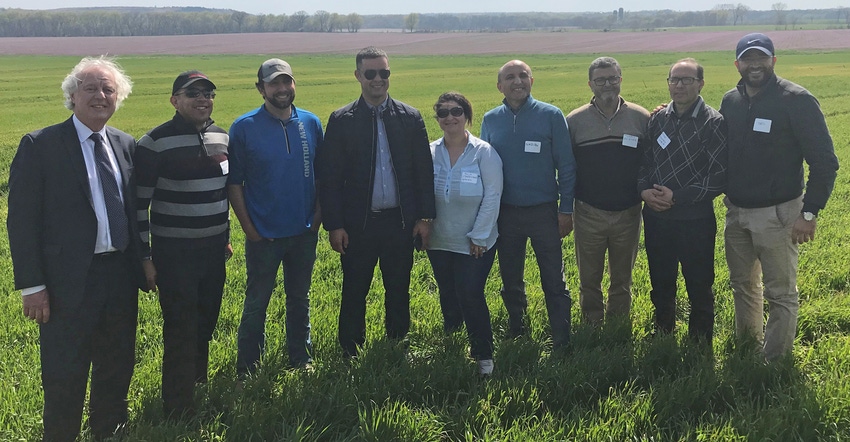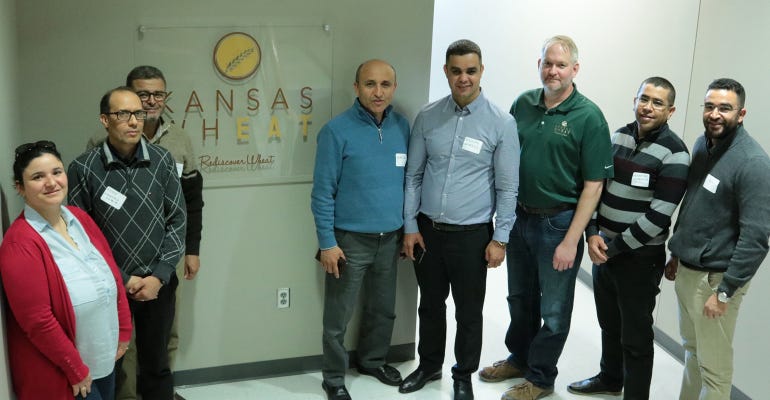April 30, 2019

Wheat buyers from Morocco and Tunisia got an up-close look at the intricacies and reliability of the U.S. grain infrastructure during the April 12-19 Cochran Fellowship Program's experience in Kansas and Texas.
Morocco and Tunisia are part of the Middle East-East and North Africa (MEENA) region, which has the largest volume of wheat imports from all origins. While market share in the MEENA region has fallen, there are several expanding end use market segments that hold promise for U.S. wheat.
These niche products include specialty artisan and frozen doughs and pre-mixes, pasta from non-durum flour, and growing biscuit, cracker and confectionary products. These products need the high or low protein (depending on the product) wheat with the high-quality traits that American wheat is known for.
"While it's unfortunate that U.S. market share in the MEENA region has dropped due to increased competition, there are some real opportunities for us in those specialty products," says Aaron Harries, vice president of research and operations for Kansas Wheat. "The U.S. wheat industry has to remain visible to those buyers in order to capitalize on these emerging opportunities. Bringing the Cochran Fellows to Kansas is a great way to do that."
Kansas was the first leg for the Cochran Fellows team. During their first day in the state, the participants visited the research space at the Kansas Wheat Innovation Center, received an overview of the U.S. grain handling infrastructure and grain quality assessment at the IGP Institute, toured the Kansas State University Hal Ross Flour Mill and the O.H. Kruse Feed Mill and ended their day at the Anderes farm near Junction City.
The next day, participants visited the Cargill Shuttle Train Loader near Topeka and the Federal Grain Inspection Service Technical Center in Kansas City, Mo.
Morocco and Tunisia's sub-region relies heavily on grain imports with bread and durum wheat as the most prominent imported cereals. These countries imported 17.35 MMT wheat of all origins in MY16/17, and 1.6 MMT of US wheat in MY16/17, 85% of which was HRW and 14.3% was durum. Morocco does buy smaller quantities of hard red spring, but mostly relies on hard red winter wheat to fill the shortage of domestic or EU production. Tunisia mostly buys U.S. durum.
 WHEAT INNOVATION: Aaron Harries, Kansas Wheat vice president of research and operations, third from left, visited with wheat buyers from Morocco and Tunisia during their visit to the Wheat Innovation Center in Manhattan. The group also visited grain handling operations in Topeka, Kansas City, Mo., and Houston.
WHEAT INNOVATION: Aaron Harries, Kansas Wheat vice president of research and operations, third from left, visited with wheat buyers from Morocco and Tunisia during their visit to the Wheat Innovation Center in Manhattan. The group also visited grain handling operations in Topeka, Kansas City, Mo., and Houston.

Team participants also visited Houston. While there, the Cochran fellows experienced Port Houston up close and personal with a Sam Houston Boat Tour along the Houston Ship Channel. This unique opportunity helped buyers to visualize international cargo vessels and operation at the port's Turning Basin Terminal. Next the Cochran fellows visited the Lansing Terminal to get a full-fledged field-to-vessel look at the country's wheat industry.
"The members of this group of Cochran Fellows were engaged and excited about the U.S. wheat industry," Harries says. "It's experiences like these that help to build, or solidify, trading relationships with our export markets."
The Cochran Fellowship Program provides short-term training opportunities to agricultural professionals from middle-income countries, emerging markets, and emerging democracies. Approximately 600 Cochran fellows come to the United States each year to work with U.S. universities, government agencies and private companies. They receive hands-on training to enhance their technical knowledge and skills in areas related to agricultural trade, agribusiness development, management, policy, and marketing.
Since the program's inception there have been more than 18,000 total fellows from 126 participating countries.
Source: Kansas Wheat, which is solely responsible for the information provided and is wholly owned by the source. Informa Business Media and all its subsidiaries are not responsible for any of the content contained in this information asset.
You May Also Like




